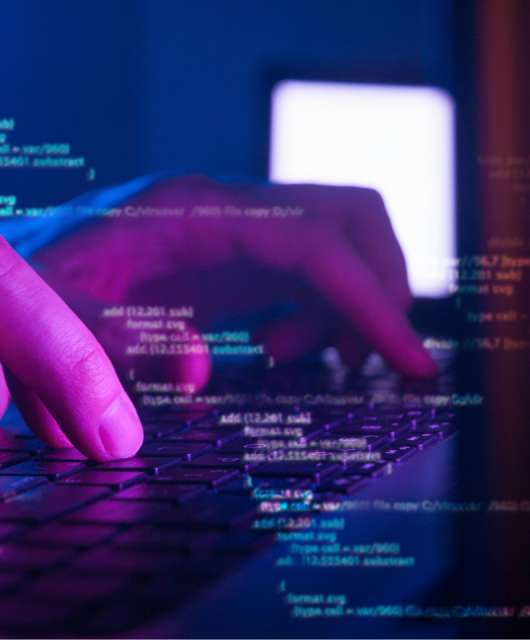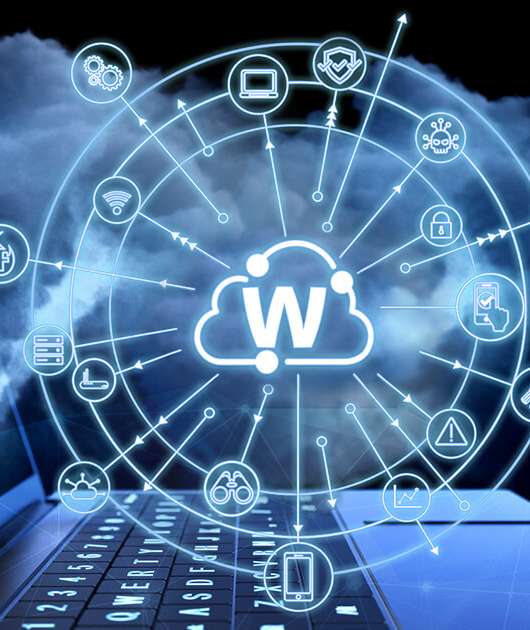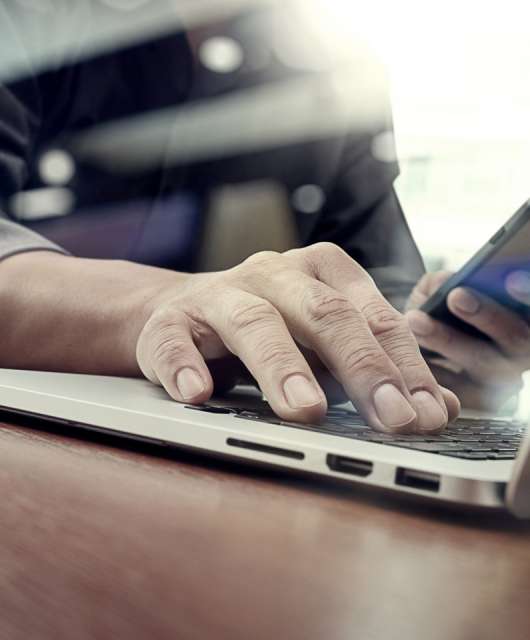We’re all guilty of it: waiting to board a plane and checking our email. Checking our account balance while in line at our favorite fast food restaurant. Adding more money to our Starbucks app before we pay so we can earn our rewards. If you’re one of the more than 80% of Americans who feel their data is accessible to identity thieves and other cybercriminals you may decide not to engage in any of these activities, but there is another, more convenient solution: using a VPN. But if you aren’t a cybersecurity expert, you may not know what a VPN is and how it can help you stay safe online.
More than 30 million users worldwide trust Panda Security to protect them online with VPN and antivirus software. Read on to learn everything you need to know about VPNs in layman’s terms so you can set one up today.
Here’s what you’ll find in this beginner’s guide:
- What is a VPN and what does it do?
- How does a VPN work?
- Types of VPNs
- Do I need a VPN?
- How to setup a VPN
- How to choose a VPN Provider
- Potential disadvantages of VPNs
- FAQs
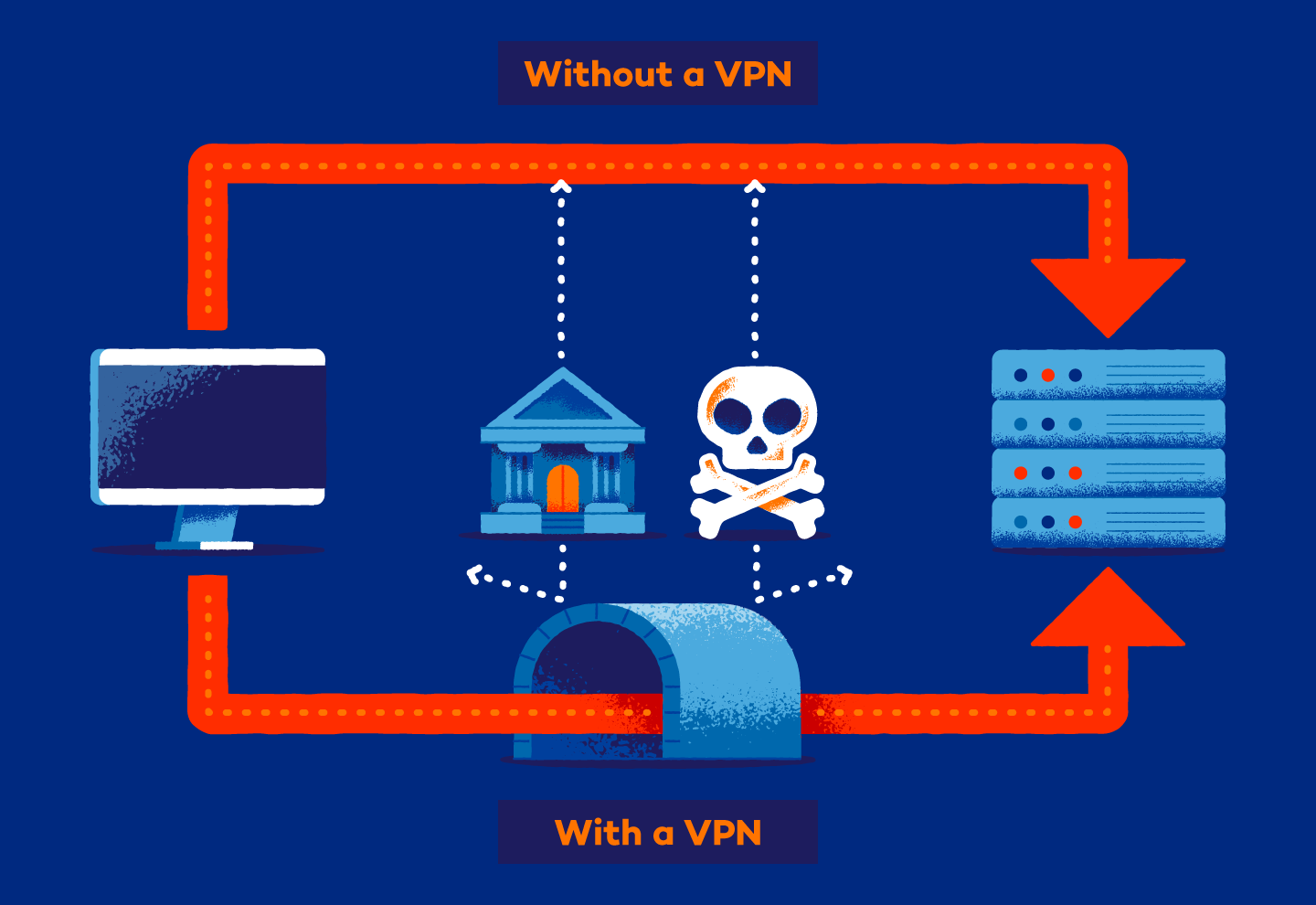
What Is a VPN and What Does It Do?
A VPN, or a virtual private network, is an internet service that provides an added layer of security to protect you and your data while you are online. Without it, everything you do online is visible to those who know how to look for it. With the rise of identity theft — reports show instances of identity theft have nearly tripled since 2017 — a VPN is one of the best ways to secure your data while you are online.
In basic terms, a VPN masks your IP address so no hacker, cybercriminal, internet service provider (ISP), advertiser, government organization or other third party knows where you are located. It also hides your online behavior by scrambling it until it is meaningless. If a cybercriminal were to hack your connection somehow, they would not be able to make sense of your data because only your computer and the VPN server have the key to decrypt it.
How Does a VPN Work?
Regardless of the provider, all personal VPNs work the same, although their security protocols may differ.
- You connect to the VPN before connecting to the internet.
- The VPN establishes a spoofed IP address on the encrypted VPN server.
- The data you send while online is encrypted by being broken down into packets, which are then wrapped in an outer packet, creating a protective tunnel around your data while it is sent to the websites you visit. The website believes the information originated from the spoofed IP address your VPN server created.
- The website sends you data, which is encrypted just like your sent data. When that data reaches your VPN server, it is decrypted and sent back to you.
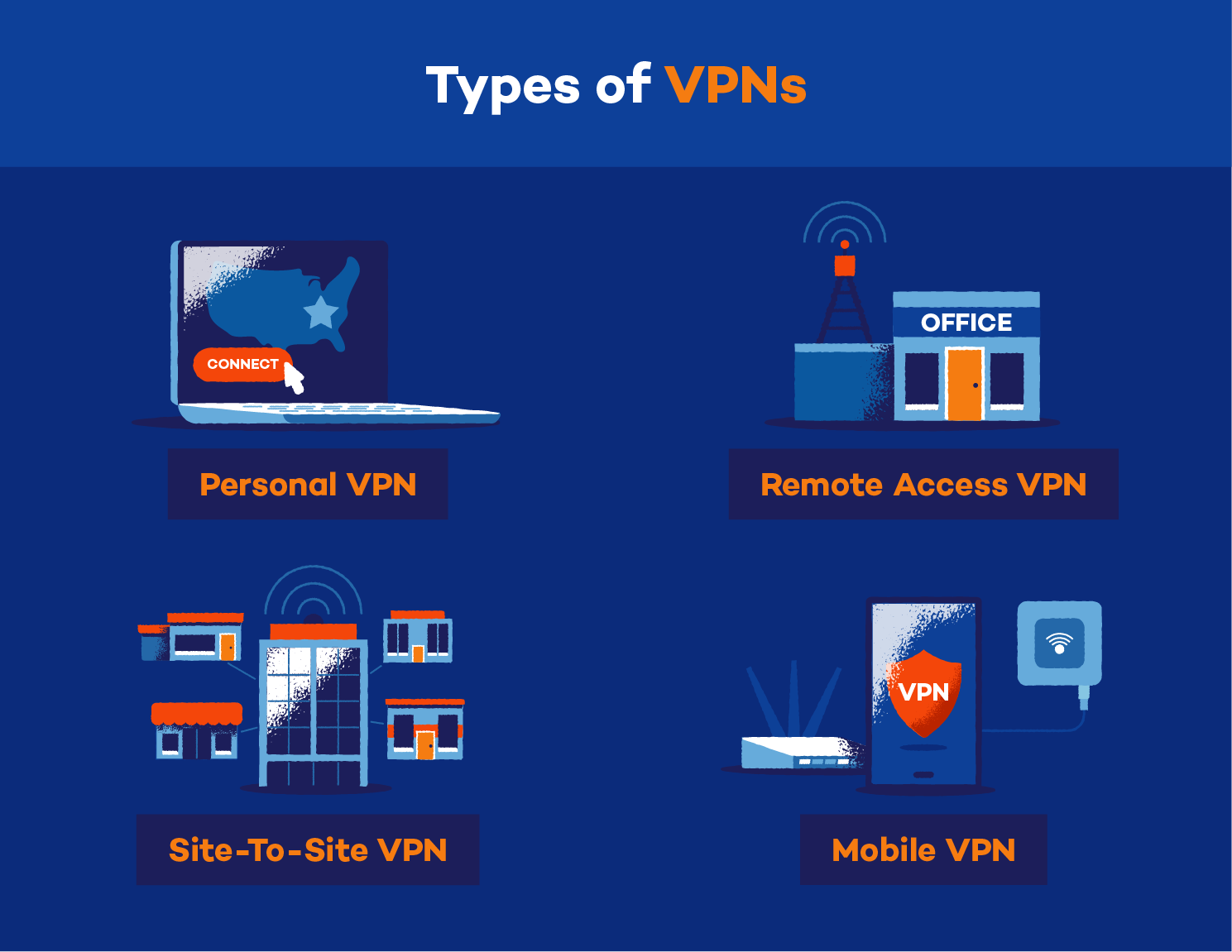
Types of VPNs
There are four types of VPNs. Personal VPNs are for personal use by individuals, while companies use the other three types (remote access VPN, site-to-site VPN and mobile VPN).
1. Personal VPN
Best for: Encrypting personal data online and hiding your geographic location on a personal device
Individual consumers like you use a personal VPN to protect their data when they are online. With this type of VPN, you connect to a VPN server before accessing the internet.
2. Remote Access VPN
Best for: Connecting remote employees to a company’s private network
An employee uses a remote access VPN to log in to their company’s private network while traveling or working remotely. Instead of connecting to a VPN server, the VPN connects the user directly to the company’s private network as if they were physically at work.
To access this VPN, you’ll need to install specific software on your computer or use a device provided by your employer with the software preloaded. Once the VPN is installed on the device, you’ll likely need to enter a username and password to access files on the private network.
3. Site-to-Site VPN
Best for: Combining two separate company networks to create one secure network
Site-to-site VPNs connect one network to another. Companies with multiple branches or businesses who work together frequently commonly use site-to-site VPNs to communicate over one shared network. This VPN creates a secure connection for trading or sharing sensitive information.
4. Mobile VPN
Best for: Users who frequently switch between Wi-Fi or cellular networks or have an unstable internet connection
A mobile VPN functions the same as a remote access VPN, but it allows users to remain connected to their employer’s local network even when they switch between Wi-Fi or cellular networks. It works by assigning a unique IP address to a device rather than the Wi-Fi or cellular network associated with it.
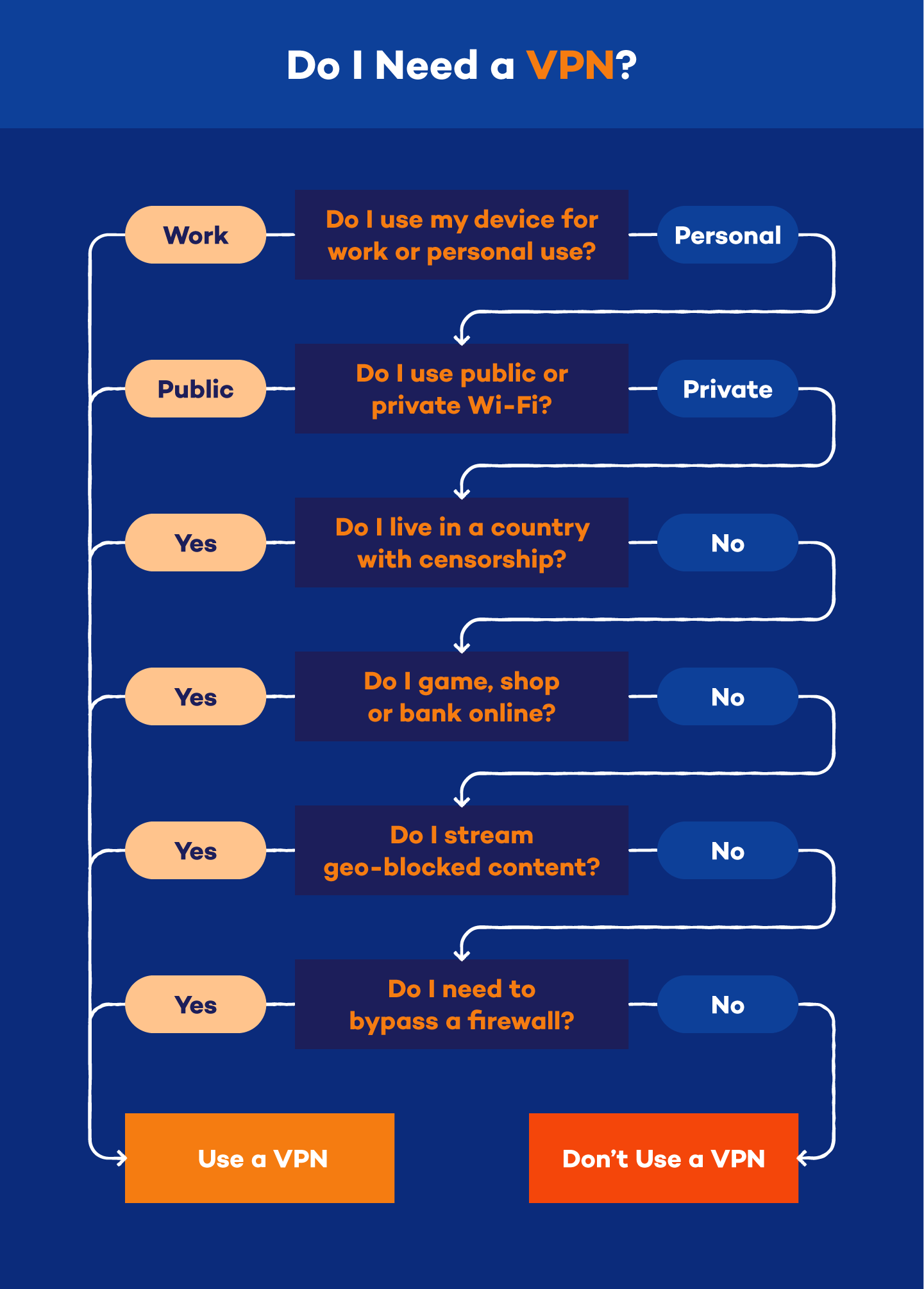
Do I Need a VPN?
Many people initially think they don’t need a VPN if they aren’t doing anything illegal. But we all do some sensitive activities online — paying bills, checking our bank accounts or researching a newly diagnosed medical condition — that we’d like to keep secret from hackers or advertisers.
You might want a VPN if you meet any of the following criteria:
1. You are concerned about what your ISP does with your data.
In October 2021, the FCC released a report detailing how several big-name ISP companies mislead their customers into believing they don’t sell their personal data, but “allow it to be used, transferred and monetized by others and hide disclosures about such practices in fine print of their privacy policies.” Some of this data was then used to generate targeted advertising, place customers into demographic categories and, in some cases, share current location information.
Even if they aren’t selling your data, ISPs aren’t immune to hacking. Having your browsing history sitting on your ISP’s server leaves you vulnerable to identity theft if they are hacked.
Understandably, people like having control over their information. One benefit of a VPN is that it blocks your ISP from seeing your online activity to protect your personal data.
2. You are concerned about government overreach.
In 2013, Edward Snowden shocked Americans with the news that the NSA had unprecedented access to their online data through the PRISM protocol. This revelation and the effective end of net neutrality in 2017 led to private consumer use of VPNs in the United States more than doubling between 2016 and 2019. Another benefit of a VPN is protection from unwanted surveillance.
Other countries, such as China and Russia, have active internet censorship practices, which may limit your access to information. In this instance, a benefit of using a VPN is it prevents censorship. However, it is worth noting that many countries with internet censorship also restrict VPN access, so using one is illegal.
3. You are concerned about what apps and internet services do with your data.
Sadly, you don’t just need to be concerned about your ISP and possible government surveillance. The apps and services we use online also don’t have a good track record when it comes to safeguarding our data.
Facebook is one of the biggest offenders. The app collects data related to purchases, financial information, location, contact information, search history, browser history and user content, and they do it even after you have exited the app.
While a VPN can’t prevent apps and internet services from collecting everything, it does hide your IP address so your identity is protected. It also limits the collection of your browser history.
4. You are a gamer.
Avid gamers may also benefit from using a VPN.
Some games are limited to specific geographic regions, whether due to censorship or licensing restrictions, so a VPN with a server in a specific area can grant you access to the game.
Since a VPN blocks your IP address and therefore your physical location, it can also protect you from trolls you may encounter online. So if you run into a sore loser in a game, their trolling behavior won’t follow you into real life.
Finally, VPNs protect you from bandwidth throttling, which occurs when an ISP deliberately slows your connection during instances of peak usage to prevent the network from being overloaded. Gamers are frequent targets of throttling since streaming games can eat a lot of bandwidth.
5. You bank or shop online.
A VPN protects your data when you bank or shop online, keeping you safe from hackers, cybercriminals and identity thieves.
In addition, it can save you money when making purchases related to travel, like a hotel reservation or airplane ticket. If you have been researching a trip, a website that sells airline tickets may be able to tell from your browsing history and therefore show you more expensive tickets.
A VPN can also protect you from price discrimination. Companies may charge different amounts for something based on where you live. For example, people who live in bigger cities like Los Angeles and New York City often pay more for the same services as someone else in a less wealthy area.
In other instances of price discrimination, your ISP may sell your data to a manufacturer you frequently buy from, who will then charge you more because they know you are a committed customer and are therefore more likely to continue buying even if the price increases.
6. You travel or use public Wi-Fi networks frequently.
Any public Wi-Fi network is susceptible to attacks from hackers, identity thieves and cybercriminals. In some cases, they’ll even create fake public Wi-Fi networks and track every password you enter so they can steal your identity.
If you use public Wi-Fi at airports, libraries or coffee shops, a VPN can keep you safe.
7. You want to stream geo-blocked content.
If you travel internationally and still want to stream the latest show you watch at home or stream region-based sporting events, a VPN can help you access them. You’ll just need to make sure you choose a VPN provider with a server in the region you want to stream content from.
While not illegal per se, we must note that spoofing your location to access geo-blocked content may violate user agreements for streaming services.
8. You want to bypass a firewall.
A VPN can help you bypass a firewall to view blocked content at work or school. However, if you are using a public device provided by the school or your employer, they may still be able to see what content you view, so use a VPN carefully.
9. You work remotely.
Microsoft originally developed VPNs as we know them in the 1990s to allow remote workers to access secure files and documents. Today, companies all over the world use them to protect the company while enabling employees to work from home or while on business trips.
How to Set Up a VPN
The setup process for a VPN can vary depending on the type you need. However, most personal VPNs are simple to install and activate.
Step 1: Install VPN software
Downloading VPN software is one of the easiest ways to install a VPN on your personal computer or device. Once you’ve chosen a reputable VPN service provider, you can start the process by installing VPN software compatible with your device and operating system. If you have Windows or Android, you can download the Panda Security VPN for free to get started. Many service providers also offer VPN apps you can download on your mobile device.
Step 2: Activate your VPN
Once you’ve downloaded VPN software, you’ll need to activate it through the main window or configurations menu. This process can vary depending on the type of VPN and device you have, so be sure to read all provided instructions carefully before activating. If you are connecting to a remote access VPN on a company device, it may already be activated for you.
Step 3: Log in or Authenticate Connection
If you are connecting to your employer’s VPN network, you’ll likely need to enter a password or install a special certificate to complete the setup process. This allows the system to verify that you are an authorized user. In some cases, you may need to re-enter your login information each time you want to connect to the network.
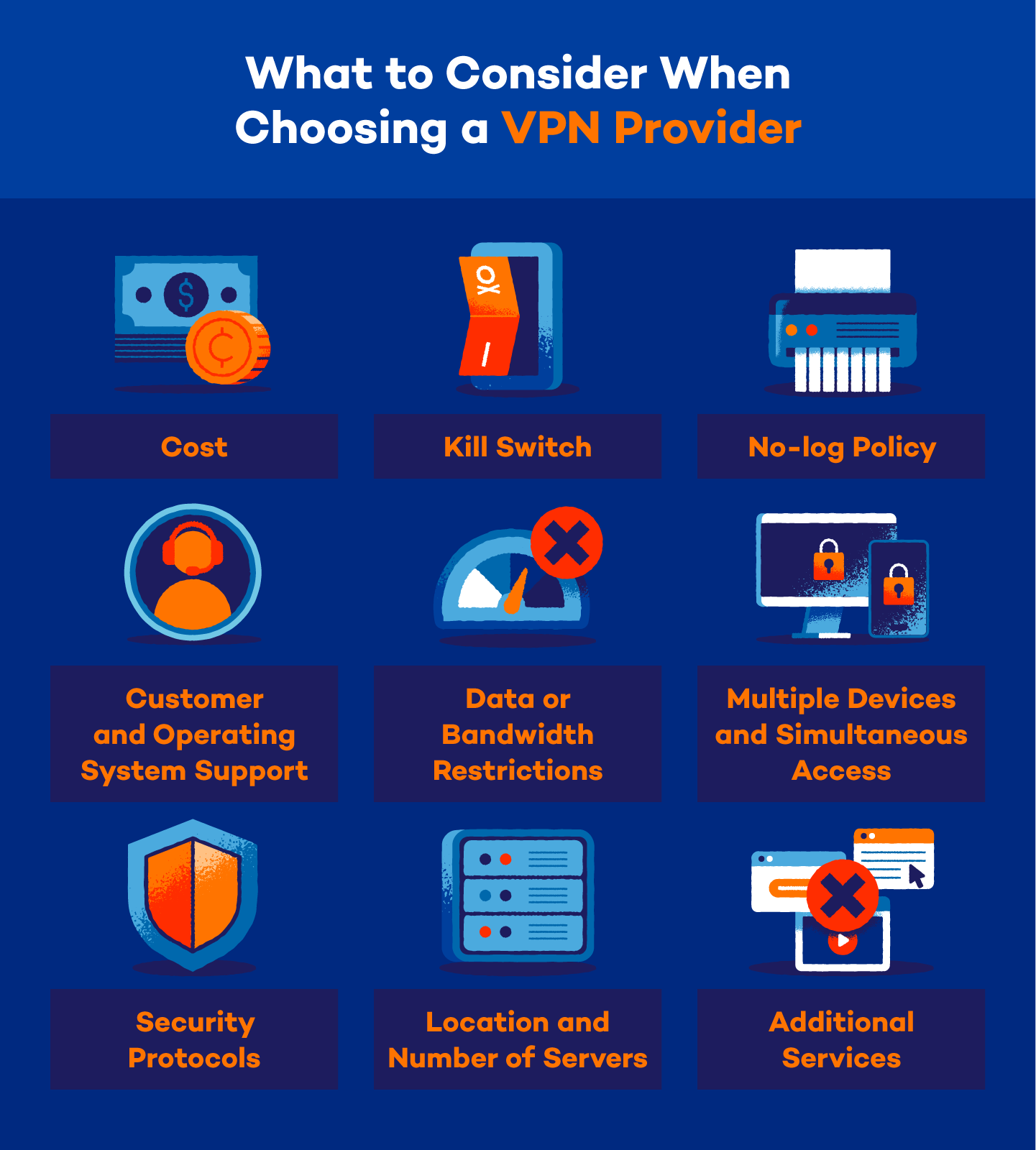
How to Choose a VPN Provider
Which VPN provider you choose ultimately depends on what you want the VPN for and what features are most important to you. We recommend considering the following:
How does a provider make their money?
For many people, this is the most important consideration in their decision. Free VPNs are available, but keep in mind that maintaining servers costs money, and a company has to make money somehow. Most free VPN providers may have higher disconnect rates or lack security because their servers are poorly maintained. Others may fund their servers by selling ads, implementing data limits or even selling logs of your online behavior.
What security protocols does the VPN provider use?
Different VPNs use different security protocols to encrypt your data, each with its own set of strengths and weaknesses. OpenVPN is one of the safest VPN security protocols because it is open source, which means it can adapt to the latest security threats quickly and easily, keeping your data secure.
Does the VPN provider have a no-log policy?
While it may seem counterintuitive, some VPN providers log your behavior online just like your ISP does. So if your primary motivation for using a VPN is to keep your browsing history private, opt for a VPN provider with a no-log policy.
How many servers does the VPN provider have, and where are they located?
Because a VPN provider assigns you an IP address on one of their servers, everything you do online must travel through that server first. If a VPN provider has a limited number of servers, more traffic will be funneled through it, which can lower speed dramatically. If the VPN server is far from you, that can also reduce your speed since your data needs to travel farther. If your primary reason for utilizing a VPN is to access geo-blocked content like a streaming service, you’ll want to ensure the VPN provider has a server in the location you want to spoof.
Does the VPN provider have data or bandwidth restrictions?
Some VPN providers restrict data or bandwidth during peak times (a sign they don’t have enough servers) or if you use a lot of data or bandwidth. You’ll want to consider this carefully depending on how much data or bandwidth you need. A gamer will need a lot more bandwidth than someone working on spreadsheets online for work.
Does the VPN provider have a kill switch?
While VPNs are safer than public Wi-Fi networks, they aren’t impenetrable. Some VPN providers include a kill switch feature so that if your connection is breached for any reason, the VPN will automatically shut down programs to protect your data.
Does the VPN provider allow access from multiple devices? Can those devices use the VPN simultaneously?
VPN providers typically allow three devices on one account, although you can pay more for access from more devices. Some VPN providers may limit how many devices can be connected simultaneously. If you are in a home with multiple family members who may be online or streaming at the same time, simultaneous access is probably more important to you than someone who lives alone.
Does the VPN provider work with your operating system, and do they provide adequate customer support?
You don’t want to pay for a VPN that won’t work on your device or that won’t be able to help you if you have a question. Read online reviews and explore social media to better understand the VPN provider’s customer service from real people.
Does the VPN provider offer additional services like ad blockers?
In addition to keeping your location and browsing history private, some VPN providers also provide additional helpful services like ad-blocking capabilities to improve your browsing experience.
Potential Disadvantages of VPNs
Using a VPN is a great strategy to protect yourself online, but it isn’t foolproof. There are a few limitations and disadvantages to using a VPN:
- A VPN does not protect you from malware, Trojans, viruses, etc. While using a VPN it’s essential to use an antivirus software as well.
- A VPN does not protect you from cookies. Cookies are small packets of code that websites send to your device to remember you. It’s how they remember your login information and what’s in your shopping cart even after you’ve logged out. Even when you use a VPN, those cookies can track your behavior, although they will be connected to your spoofed IP address to maintain your privacy.
- A VPN does not stop apps from seeing what you like. They will still see what content you engage with and use that information to tailor what ads you see within the app. The VPN will, however, keep that information from being tied to your IP address.
- A VPN on your phone does not protect your phone calls or text messages. VPNs only encrypt what is transmitted through an internet connection. Your phone provider can still access your call and text records.
- A VPN can be hacked. It’s recommended to use a VPN with a no-log clause. If the VPN server is hacked, there’s no record of your online behavior.
- A VPN can slow your internet connection. Utilizing a VPN adds another step to the data transmission process between your computer and your end destination on the internet. This step can take additional time, especially if you are connecting to a VPN server that is geographically far from you.
FAQs
To learn more about VPNs, consider these most frequently asked questions:
Are VPNs safe?
As long as you choose a reputable service provider, installing a VPN is one of the safest ways to protect your data and online activity. That said, VPNs do have some limitations. They don’t protect against phishing scams or malware, so it’s important to use quality antivirus software as an added layer of protection.
Should I leave a VPN on all the time?
You connect to your VPN every time you use your device, especially if connecting to public Wi-Fi. This ensures that your connection is always private and prevents third parties from accessing your personal data or online activity.
Can you be tracked when using a VPN?
Unfortunately, you can still be tracked while using a VPN in some cases. If your VPN is low quality or isn’t installed correctly, it may not offer as much protection as it should. Certain activities — like posting personal information online or logging into your Google account — can also allow third parties to access your location or other sensitive information, even when using a VPN.
How much does a VPN cost?
The costs to install a VPN varies depending on the type, device and level of protection. Some companies offer free personal VPN downloads, while premium versions can cost anywhere from $2 to $15 a month.
Can anyone identify whether I’m using a VPN?
No website you visit will be able to tell that your IP address belongs to a VPN server. It will look like any other IP address.
Your ISP, however, will be able to tell that the IP address they assigned you doesn’t match the one you are operating from, but you are not violating any laws, so there’s nothing they can do.
Are VPNs legal?
In most countries, VPNs are legal. However, in countries with internet censorship, using a VPN may be limited or outright illegal.
Remember, if you engage in illegal activity while on a VPN, that activity is still illegal. A VPN isn’t a get-out-of-jail-free-card for committing crimes.
Does using a VPN drain your device’s battery?
Using a VPN can drain your device’s battery, but some VPN services include a power saver feature that will turn off the VPN whenever your device sleeps. This can save you some battery life.
Are there free VPN providers?
There are free VPN providers, but keep in mind that they have to make money somehow, and if they aren’t making it from you, chances are they may log your data and sell it or allow advertising while using the VPN. Other companies may not properly maintain their servers, leading to service disruptions and slower speeds.
Do I still need antivirus software if I use a VPN?
VPNs only encrypt your data and your IP address, so you will still need antivirus software to protect you from malware and other threats while you are online.
Can I use a VPN on my phone?
Yes, you can install a VPN on your phone. Since most phones connect to public Wi-Fi networks, it’s crucial to protect your phone with a VPN.
To install a VPN on your phone, you’ll need to download an app from the Android or Apple app store.
In August 2022, security researcher Michael Horowitz revealed that Apple devices might circumvent any installed VPN, allowing them to leak data. For that reason, be wary when online on an iOS device, even when your VPN tells you it’s connected.
What is a VPN number?
This is a common misconception. A VPN does not have a number; rather, it hides your actual IP address (a four- to six-digit number) and spoofs a new one on their encrypted server.
However, if you are using a corporate VPN, they may use several different ones that are identified by a number.
What’s the difference between a VPN and Tor?
Both VPNs and Tor protect your identity, location and data while online.
Tor is an internet browser that hides your data by channeling it through three different Tor servers called nodes and encrypting it at each stage. While this bouncing and triple-layered encryption make your data difficult to track, it also significantly slows down your internet connection.
A VPN, in contrast, only has one extra point in your data’s internet journey, making it significantly faster than a Tor browser.
VPNs are quickly gaining popularity as a cybersecurity tool thanks to their ease of use and cybersecurity capabilities. If you’re ready to install a VPN on your device, consider our VPN options for Windows and Android or check out our guide on how to check that your VPN is working.
Sources: YouGov | Consumer Sentinel Network | FCC | Washington Post | Forbes | Wired | PC Matic | Investopedia | Wired


